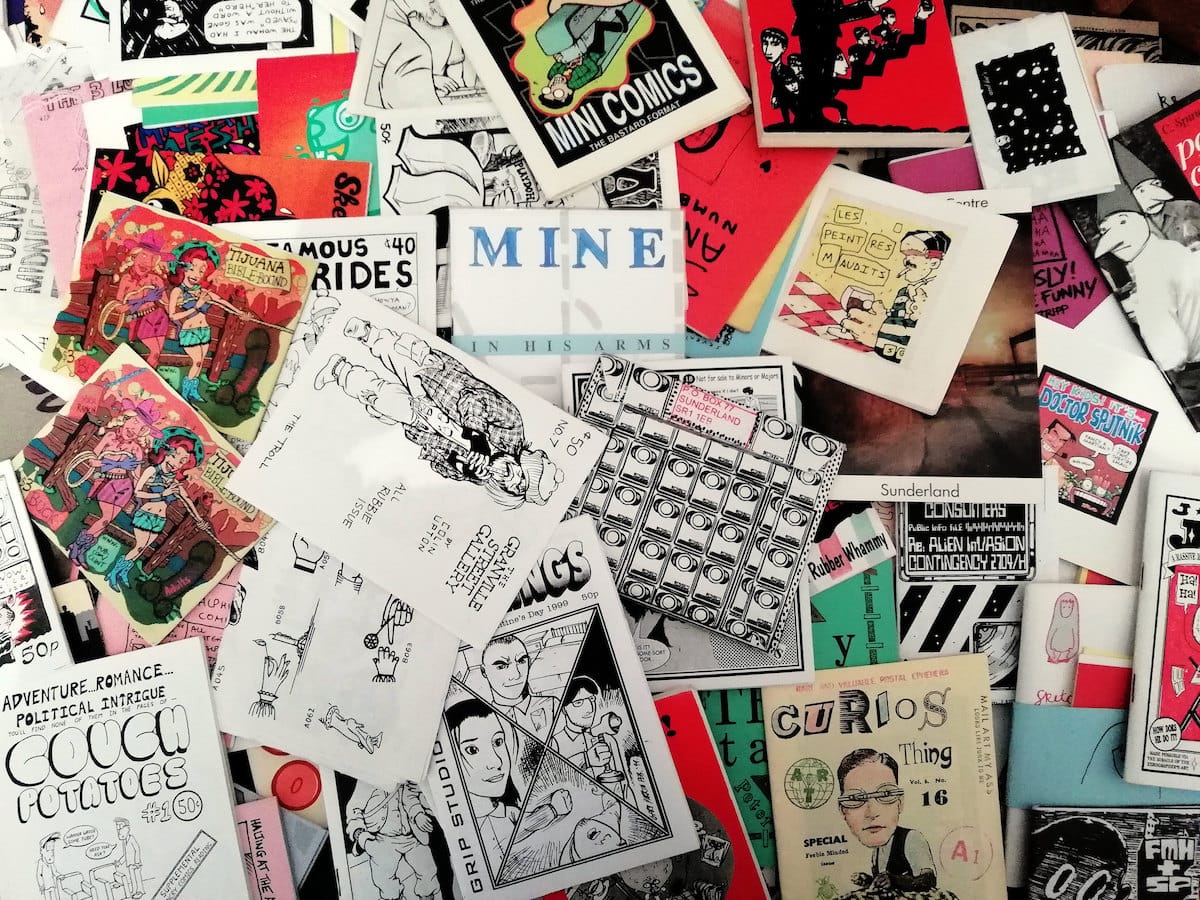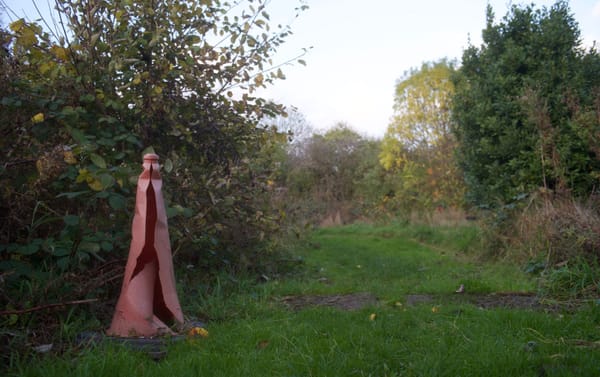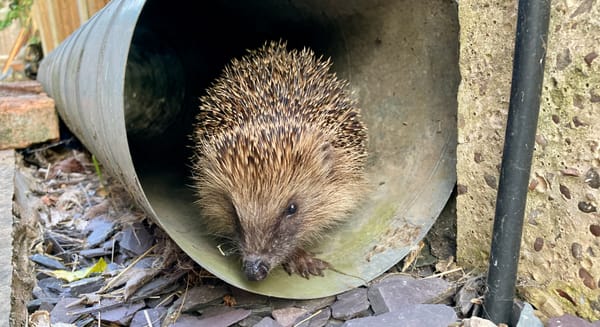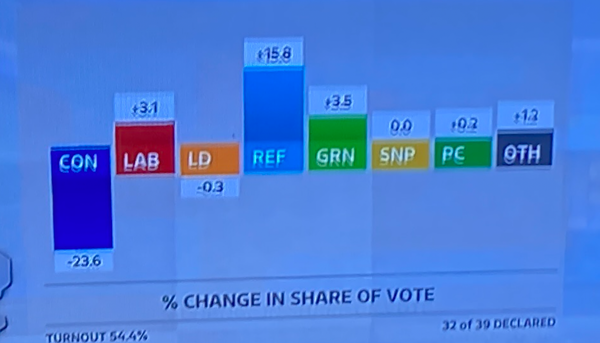Scanning the BugPowder zine archive
I have boxes containing thousands of zines. I've started scanning them. It's going to take a while. I have time.

As some of you will know, in the 1990s I was involved in various overlapping zine and self-published comic book scenes. Mostly I did review zines and ran a mail order service, which meant I got sent loads photocopied zines for review or speculative sale or both. Initially my scope was comics in the UK but, as was the nature of these things, by the end of the 90s I was getting stuff about all topics sent from all over the world. I was also buying things for myself, of course, often getting everything at a comics mart or zine fair, and it all added up to many thousands of zines, usually photocopied and assembled by hand in runs of around a hundred, if that.
I stopped most of my activity around 2000 and slowly drifted away from the scene, eventually drawing a firm line so I could start new things afresh, but I carried these boxes of zines around with me. They had no financial value so I couldn't eBay them, or donate them to Oxfam (as I did with my "normal" comics). No-one was ever going to pay me money for them – with a tiny number of exceptions there were no famous names. But they felt important and I can wax lyrical about how the 90s zine scenes were the proto-web, open access, zero-budget publishing and distribution networks where anyone could publish anything. Technological progress had put a photocopier in every college and community centre and the postal service was still affordable. If you had an idea and a need to tell other people about it, this was how you did it. The quality might have varied wildly, from unique gems to what-were-you-thinking trashfires, but what they represented felt worth saving.
In 2015 I was in touch with the Victoria and Albert museum who were interested in taking the zines but despite their enthusiasm the actual handover got delayed by building work and communications fizzled out.
In 2018 a couple of young artist friends, who had been making their own zine about the Birmingham cross city railway line, discovered I had all this stuff and wanted to have a look. After spending a day ploughing through the boxes in my spare room they decided to put them all on display at Artefact, our local weird art cafe, and filled the back room with them. The show was up for a week, I did a little talk with fellow ageing zinester Jez Higgins. It all went down pretty well but I had no desire to properly revisit the collection. Back in the boxes it went.
Late last year I saw a Tom Scott video where he visited one of the British Library's massive storage warehouses where they keep all the printed matter they can get their hands on for historical posterity. I sent a speculative email off explaining what I had and asking whether they'd be interested in it and got a long email back from one of the curators, very enthusiastic about taking the collection but cautioning me that while they'd be safe, access would be pretty limited. She suggested some actual zine libraries which would offer more access. The decision seemed to be between safe long-term storage for as long as Britain exists, and better access with an entity that might not be around forever. Having seen many archival projects falter over the years I was erring towards security with obscurity. And then a particularly shitty year caught up with me and everything got thrown on the back seat.
One scan at a time
For the last couple of months I've been signed off work with chronic fatigue and strict instructions to rest. Unfortunately my fatigue comes from a mix of long-Covid exhaustion and stress which sticks a rocket under my autistic traits, so I've been finding it very hard to rest. Once I've properly stopped my brain gets bored and hungry for something to do, so I start something that feels manageable, like a blog post, but then the neurons in my skull go into overdrive and I'm trying to cover all the things and make the perfect whatever-it-is which I can't because my brain is sprained and I'm in recovery dammit, so I crash and feel like poop, then rest and recover and then the whole thing starts all over again with some other seemingly innocuous activity.
I soon realised that until I figure out how to fix my sprained brain (which I am getting help with, because fixing a sprained brain with a sprained brain is kinda tricky) I need activities that keep it occupied without spiralling into mega-projects. So I've been pottering around, tidying and sorting my various archives, physical and digital, and while rearranging a corner of the spare room I moved all the boxes of zines for the first time in a long while. There they were. All these zines. Hmm...
Separate to all this, during nights of insomnia I've been exploring various shadow libraries. These are publicly available archives of scanned and bootlegged books and journals, sort of like if the Internet Archive and Wikimedia didn't give a toss about copyright. Mostly it's mass copyright infringement of dubious legal and moral standing, but I started to get interested in what I was seeing on the peripheries. Whether by accident or design, some really obscure publications had been carefully scanned and added to the archives. Not many, but enough that I could put in a cartoonists name or zine title and maybe find a couple of scans, things that really are not available at all anywhere at any price. Stuff like I had in my boxes.
On a whim I dug out the flatbed scanner and scanned a zine. The process demanded just the right level of attention and took just long enough to feel like I was doing a thing, without being too much of a thing to be doing. I scanned another, and then another. At time of writing I've scanned 80 zines from the first box. They're mostly A5 zines so I'm scanning them as double page A4 spreads at 300dpi, saved as TIFF files. High enough resolution for basic archiving but not too insane size-wise.
I've decided to scan them in a "photographic" sense, in that I'm treating them as objects rather than raw material. You could probably process the scans to make them printable if you wanted, but I'm not worrying about rough edges and bleed-through. These are objects and I want to record them as such. The flaws are the thing.
I don't know how many zines I have. I've never sat down and counted them, let alone listed them. There are fifteen boxes that would hold piles of A4 paper 25 cm deep, which I calculate to be 236 litres of zines. More practically, those of us who've spent a lot of time around photocopiers know that a sheet of 80 gsm paper is 0.1mm thick and so if the boxes stand 3.75 metres tall they should contain roughly 37,500 sheets of paper. Assuming they're all double sided copies that's a maximum of 75,000 scans.
(Of course there's a variety of paper stocks with a lot of card covers, plus the folded spines never sit perfectly flat, so I think we could shave a decent amount off that number. How much? No idea.)
Between the 6th and 12th of June I spent an hour or so each evening scanning a handful of zines, and produced 900 TIFF files. I've enjoyed the process and haven't found it boring or tiring and if I were to keep it up I'd have everything scanned in about 18 months. I have to say that's faster than I was expecting. As for storage, the same calculation throws up 1TB, which isn't too bad either.
(As I was writing this it was announced that Caption, the small press comics convention that was the heart the 1990's community for me, is coming back in 2025. Assuming they pick a date later in the year I think that makes a good target to aim for.)
The ethics of it all
If I do see this through I'm not sure what I should do with the files. I don't think I should make them public because they weren't intended to be made public on an internet scale. Some of them are deeply personal autobiographic comics and while yes, they technically were made for public consumption, they were done so with the understanding they might only reach maybe a hundred people at most.
And these are things that people put out in the world 30 years ago, when a lot of them were young and reckless. I wrote a lot of nonsense in my zines back then and I quite like the idea that no-one can easily read them. I have no regrets, because I learned from my many mistakes, but I have no desire to fetishise their existence. It's bad enough that my 2000's era blog posts are on the Internet Archive without my 1990s zines joining them.
As I've been scanning I've looked up a few names and found a few blogs and social media accounts, and it's notable that they're not proudly making their juvenilia widely available. Of course if they want to use my scans to put them out there then great! But I'm not going to make that decision for them.
So no, I won't be adding them to the shadow libraries. I'd like to get them all on a spreadsheet and maybe start cataloguing the contents without making them public. I think the covers are fair game; Ed Pinsent has been slowly doing this with his archive of mostly 80s comics zines and it feels about the right scale. But the scans themselves will be for research and cataloguing use only, at least until everyone involved is dead.
And once I have everything digitally recorded, the zines themselves can go to the British Library to be carefully stored until the apocalypse.
This is as close to a plan as I'm prepared to let myself make – scan, save and make a spreadsheet – but as I'm going through them I'm remembering stories that might be worth telling. These stories might emerge here over the next couple of years. If that's something you'd like to see, please let me know.
I'm also gaining a new appreciation for the art of archival scanning. There's more to it than simply whacking it on the glass and clicking the button. I might write about that too.
If you're interested in what's been scanned already I'll be updating a list at bugpowder.peteashton.com every so often, along with some half-baked stats on the progress.
But mostly I'm just gonna scan a few zines each night.


